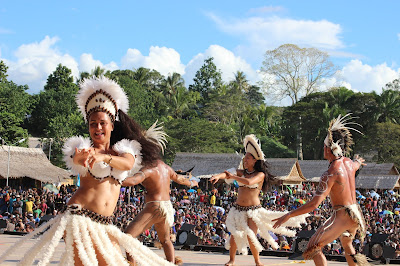 |
| Image: Rapanui dancers at the 2012 Festival of Pacific Arts, Honiara (Photo D. Bendrups) |
1. How did you end up researching in the field you're in?
I’d love to say that it was all part of a well-planned career strategy, but to be honest, my transition into a research career was part serendipity and part pragmatism. Like many current HDRs, I entered research from an industry or ‘practice’ background. My field of practice was music performance. When the opportunity arose to do a PhD with a scholarship (something quite attractive to a struggling musician), I took it, but without much thought for where it would lead. My doctorate considered the role of music in cultural sustainability on remote Easter Island (Rapanui). This led to further engagement with music and culture in the Pacific region, especially in Polynesia and Pacific-rim Latin American countries, where I already had some language and cultural knowledge. My emerging profile in this area led to my first real academic appointment in New Zealand, where Pacific-focused research is strategically significant to the nation’s cultural and research agendas. I maintain a specific interest in Rapanui as a primary research field, however, I have also been able to extend this to include topics in which Rapanui (and, for that matter, music) is perhaps more peripheral. At present, this is reflected in my work concerning trans-Pacific cultural phenomena, especially those that connect Oceania with Latin America.
2. Do you ever have topic envy? If so, what research topic do you fantasise about?
Actually, I’ve more often been the subject of others’ topic envy, especially those who think that doing music-based field research on a subtropical Pacific island sounds like a holiday. It’s not. My work depends on important relationships, built up over time, with an indigenous community facing considerable social, economic, political and cultural challenges. I try to ensure that my research goals are responsive to community concerns, and I advocate a decolonisation perspective. All of this makes for quite intricate work with strong personal and emotional demands on the researcher. Sometimes I fantasise about being able to just go to the Pacific on holiday, not for research.
3. What's the best research moment you’ve had?
Hard to narrow it down to just one, but perhaps this: in 2012 I accompanied the Rapanui delegation to the quadrennial Festival of Pacific Arts. The delegation included the children and grandchildren of culture bearers who had informed my doctoral research a decade prior. It was great to see these young people engaging with the cultural practices of their ancestors, and I felt privileged to have played a small part in helping to sustain their knowledge.
4. If you were a graduate researcher again, what would you do differently?
I would be much more protective of my time. I took many of the freedoms of the PhD journey for granted, and perhaps indulged a bit too much in side projects that were not strictly necessary. Now, after 12 years in academia, I’ve realised that I’m unlikely to have the luxury of being able to focus on a single research project like a PhD again.
5. Do you have any advice to offer on scholarly collaboration and/or networking?
Take advantage of the formal and informal opportunities offered through your institution. Be proactive about finding a place in your field, don’t just sit back and wait to be noticed. At the same time, try to avoid overstating the importance/significance /etc. of your work, as chances are that the academic community has seen something similar before. Really unprecedented work tends to stand on its own merits, but still needs to be communicated well, so prepare your research presentations, and pay attention to detail. Try to convey a sense of the future significance of your work, a sense of where it might all be heading.
--------------------------------------------
Dan Bendrups is an Australian musician and ethnomusicologist.
He is best known for his work on music and cultural heritage on Easter Island, reflected in multiple publications, recordings and collaborations with museums and other cultural institutions on Rapa Nui and in mainland Chile.
His research has been funded by FONDART (Chile), UNESCO, universities and other government agencies in Australia and New Zealand. He has produced over 50 publications concerning music and heritage in Australia, Latin America and the Pacific, as well as contributions to theory and method in practice-based research.

Comments